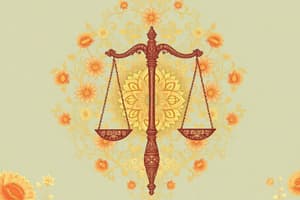Podcast
Questions and Answers
How did Beauchamp and Childress's approach to bioethics impact its relationship with professional discourse?
How did Beauchamp and Childress's approach to bioethics impact its relationship with professional discourse?
Their approach deprofessionalized medical ethical discourse, allowing bioethics to become a public discourse open to everyone, not just professionals.
What historical event significantly influenced the development of both bioethics and human rights?
What historical event significantly influenced the development of both bioethics and human rights?
Both were conceived in response to the horrors of the Holocaust.
What common value do bioethics and human rights share regarding individuals?
What common value do bioethics and human rights share regarding individuals?
Both support respect for persons as a fundamental principle.
In what way are bioethics and human rights positioned regarding universality?
In what way are bioethics and human rights positioned regarding universality?
What was the effect of Cold War realism on the discourse surrounding bioethics and human rights?
What was the effect of Cold War realism on the discourse surrounding bioethics and human rights?
What role did governmental and nongovernmental organizations play in the resurgence of bioethics and human rights?
What role did governmental and nongovernmental organizations play in the resurgence of bioethics and human rights?
How did the Nuremberg Code contribute to the relation between bioethics and human rights?
How did the Nuremberg Code contribute to the relation between bioethics and human rights?
What criticism is directed toward American bioethics in relation to human rights?
What criticism is directed toward American bioethics in relation to human rights?
What is the primary limitation of grounding bioethics discourse solely in human rights?
What is the primary limitation of grounding bioethics discourse solely in human rights?
How does human rights discourse contribute to addressing moral parochialism?
How does human rights discourse contribute to addressing moral parochialism?
Why is the debate over the scope and limits of human rights considered essential?
Why is the debate over the scope and limits of human rights considered essential?
What role does cultural perspective play in the conception of morality according to the text?
What role does cultural perspective play in the conception of morality according to the text?
How did discussions at international forums contribute to the author's work on human rights?
How did discussions at international forums contribute to the author's work on human rights?
Who are the authors contributing to the discourse on bioethics in the Kennedy Institute of Ethics Journal from 1998?
Who are the authors contributing to the discourse on bioethics in the Kennedy Institute of Ethics Journal from 1998?
What is the significance of human rights discourse being described as 'cosmopolitan'?
What is the significance of human rights discourse being described as 'cosmopolitan'?
What did the author compare to illustrate their points about bioethics and human rights?
What did the author compare to illustrate their points about bioethics and human rights?
What concept did Sargent Shriver, André Hellegers, or Van Rensselaer Potter coin in the early 1970s that is now widely accepted?
What concept did Sargent Shriver, André Hellegers, or Van Rensselaer Potter coin in the early 1970s that is now widely accepted?
What is emphasized in the Preamble of the 1997 Convention for the Protection of Human Rights and Dignity concerning human rights?
What is emphasized in the Preamble of the 1997 Convention for the Protection of Human Rights and Dignity concerning human rights?
What should the human rights discourse be subjected to?
What should the human rights discourse be subjected to?
In what year was the term 'bioethics' given canonical status by the Library of Congress?
In what year was the term 'bioethics' given canonical status by the Library of Congress?
Which landmark work by Beauchamp and Childress discusses principles of biomedical ethics?
Which landmark work by Beauchamp and Childress discusses principles of biomedical ethics?
What document published by Daniel Callahan is considered an authority for the term 'bioethics'?
What document published by Daniel Callahan is considered an authority for the term 'bioethics'?
What was the main issue revealed by Henry Beecher's 1966 article regarding research papers?
What was the main issue revealed by Henry Beecher's 1966 article regarding research papers?
What prompted the National Institutes of Health to mandate peer review in 1966?
What prompted the National Institutes of Health to mandate peer review in 1966?
What is the primary critique presented by Baker regarding moral fundamentalism in his discussions?
What is the primary critique presented by Baker regarding moral fundamentalism in his discussions?
What common thread can be found in the responses by Beauchamp and Macklin to Baker's arguments?
What common thread can be found in the responses by Beauchamp and Macklin to Baker's arguments?
What was the outcome of Senator Edward Kennedy's investigation into the syphilis study?
What was the outcome of Senator Edward Kennedy's investigation into the syphilis study?
What key ethical principles were established in the Belmont Report of 1978?
What key ethical principles were established in the Belmont Report of 1978?
How did Tom Beauchamp and James Childress expand upon the Belmont Report's principles?
How did Tom Beauchamp and James Childress expand upon the Belmont Report's principles?
What was the significance of the 'convergence' concept in the justification of ethical principles?
What was the significance of the 'convergence' concept in the justification of ethical principles?
What did the National Commission aim to achieve with its numerous reports after the National Research Act?
What did the National Commission aim to achieve with its numerous reports after the National Research Act?
What type of study was investigated by Senator Edward Kennedy, and why was it controversial?
What type of study was investigated by Senator Edward Kennedy, and why was it controversial?
What principle did the Nuremberg judges emphasize when condemning the Nazi doctors?
What principle did the Nuremberg judges emphasize when condemning the Nazi doctors?
How did the Nuremberg Code influence American bioethics in the 1970s?
How did the Nuremberg Code influence American bioethics in the 1970s?
What was the symbolic purpose of the Final Declaration of Helsinki according to the text?
What was the symbolic purpose of the Final Declaration of Helsinki according to the text?
What is the primary argument for integrating human rights into global bioethics?
What is the primary argument for integrating human rights into global bioethics?
According to the content, what differentiates human rights from laws and ethical principles?
According to the content, what differentiates human rights from laws and ethical principles?
Why is principlism considered too parochial for international bioethics?
Why is principlism considered too parochial for international bioethics?
What historical accident is mentioned concerning the rebirth of human rights and bioethics?
What historical accident is mentioned concerning the rebirth of human rights and bioethics?
What was Ivy's suggestion regarding transcultural ethics, and how was it received by the Nuremberg judges?
What was Ivy's suggestion regarding transcultural ethics, and how was it received by the Nuremberg judges?
How does rights discourse support the goals of both bioethics and human rights theory?
How does rights discourse support the goals of both bioethics and human rights theory?
What does political theorist Michael Ignatieff assert about human rights movements and the Soviet system?
What does political theorist Michael Ignatieff assert about human rights movements and the Soviet system?
What do different societies bring to the concept of bioethics according to the proposed reconciliation with human rights?
What do different societies bring to the concept of bioethics according to the proposed reconciliation with human rights?
Why might the Nuremberg Code be considered an artifact of the pre-human rights era?
Why might the Nuremberg Code be considered an artifact of the pre-human rights era?
What is Richard Rorty's observation regarding contemporary ethical culture?
What is Richard Rorty's observation regarding contemporary ethical culture?
What was Ivy's proposal regarding the principles of international bioethics?
What was Ivy's proposal regarding the principles of international bioethics?
In what way does a human rights-based bioethics avoid disputes over principles?
In what way does a human rights-based bioethics avoid disputes over principles?
What shared goal do both bioethics and human rights theory aim to achieve?
What shared goal do both bioethics and human rights theory aim to achieve?
Flashcards
Origin of the Term "Bioethics"
Origin of the Term "Bioethics"
The term "bioethics" was coined in the early 1970s, potentially by Sargent Shriver, André Hellegers, or Van Rensselaer Potter. It became widely recognized when the Library of Congress categorized it as a subject heading, citing an article by Daniel Callahan titled "Bioethics as a Discipline". Callahan is also credited with coining the term.
Principles of Biomedical Ethics
Principles of Biomedical Ethics
The book "Principles of Biomedical Ethics" by Tom L. Beauchamp and James F. Childress is a significant work in bioethics. It has been published in multiple editions since its initial release in 1979.
Convention on Human Rights and Biomedicine
Convention on Human Rights and Biomedicine
The Convention on Human Rights and Biomedicine, adopted by the Council of Europe in 1997, focuses on human rights and dignity concerning the application of biology and medicine. This document references "rights" and "human rights" multiple times but doesn't mention "principles".
What did the NIH mandate in 1966?
What did the NIH mandate in 1966?
Signup and view all the flashcards
What did an article in The New England Journal of Medicine reveal in 1966?
What did an article in The New England Journal of Medicine reveal in 1966?
Signup and view all the flashcards
What sparked public outrage in 1973?
What sparked public outrage in 1973?
Signup and view all the flashcards
What did the National Research Act (NRA) establish?
What did the National Research Act (NRA) establish?
Signup and view all the flashcards
What did the National Commission publish?
What did the National Commission publish?
Signup and view all the flashcards
What are the three basic ethical principles outlined in the Belmont Report?
What are the three basic ethical principles outlined in the Belmont Report?
Signup and view all the flashcards
What justifies the binding nature of ethical principles in research?
What justifies the binding nature of ethical principles in research?
Signup and view all the flashcards
Who proposed adding a fourth principle to the Belmont Report principles?
Who proposed adding a fourth principle to the Belmont Report principles?
Signup and view all the flashcards
Bioethics
Bioethics
Signup and view all the flashcards
Human Rights
Human Rights
Signup and view all the flashcards
Principle-based ethics
Principle-based ethics
Signup and view all the flashcards
Deprofessionalization of ethics
Deprofessionalization of ethics
Signup and view all the flashcards
Transnational ethical judgment
Transnational ethical judgment
Signup and view all the flashcards
Respect for persons
Respect for persons
Signup and view all the flashcards
Holocaust as catalyst
Holocaust as catalyst
Signup and view all the flashcards
Protection of vulnerable populations
Protection of vulnerable populations
Signup and view all the flashcards
Global Bioethics
Global Bioethics
Signup and view all the flashcards
Principlism
Principlism
Signup and view all the flashcards
Cultural Variation in Principlism
Cultural Variation in Principlism
Signup and view all the flashcards
Reconciling Bioethics with Human Rights
Reconciling Bioethics with Human Rights
Signup and view all the flashcards
Rights Discourse
Rights Discourse
Signup and view all the flashcards
Cultural Context in Principle Application
Cultural Context in Principle Application
Signup and view all the flashcards
Transcultural Scope of Human Rights
Transcultural Scope of Human Rights
Signup and view all the flashcards
Moral Parochialism
Moral Parochialism
Signup and view all the flashcards
Cosmopolitan and International Human Rights
Cosmopolitan and International Human Rights
Signup and view all the flashcards
Human Rights as a Panacea
Human Rights as a Panacea
Signup and view all the flashcards
Limits and Scope of Human Rights
Limits and Scope of Human Rights
Signup and view all the flashcards
Principles to Protect Human Rights
Principles to Protect Human Rights
Signup and view all the flashcards
Intense Ethical Dilemmas
Intense Ethical Dilemmas
Signup and view all the flashcards
Common Mode of Moral Discourse
Common Mode of Moral Discourse
Signup and view all the flashcards
Inviolability of Human Rights
Inviolability of Human Rights
Signup and view all the flashcards
Nuremberg Code
Nuremberg Code
Signup and view all the flashcards
Nuremberg Code and Human Rights
Nuremberg Code and Human Rights
Signup and view all the flashcards
Helsinki Declaration
Helsinki Declaration
Signup and view all the flashcards
Belmont Report
Belmont Report
Signup and view all the flashcards
Human Rights Movement
Human Rights Movement
Signup and view all the flashcards
Human Rights and Accidental Inclusion
Human Rights and Accidental Inclusion
Signup and view all the flashcards
Helsinki Declaration and the Soviet Union
Helsinki Declaration and the Soviet Union
Signup and view all the flashcards
Study Notes
Bioethics and Human Rights: A Historical Perspective
- The "sacred rights of Mankind" are inherent in human nature and cannot be erased. – Alexander Hamilton (1787)
- Bioethics and human rights emerged after the Holocaust, with moral outrage inspiring the need for new concepts for protection.
- Initially, bioethics aimed to protect human rights.
- The 1948 UN Declaration of Human Rights built on the "droits de l'homme" (rights of man) concept from 1789, drawing on principles of natural, inalienable, and sacred rights.
- The French Republic declared rights to liberty, security. property, and resistance to oppression in 1789.
- The 1776 American Declaration of Independence emphasized God-given rights to life, liberty, and the pursuit of happiness.
- Human rights were moribund in the early 20th century.
- The Nuremberg trials (1947) highlighted crimes against humanity, leading to the creation of a human rights declaration and the recognition of the need to protect basic human rights.
- The trials exposed how human rights could be taken away.
- Eleanor Roosevelt established a committee to draft the Human Rights Declaration after the Nuremberg trials.
The 1948 UN Declaration
- The UN Declaration responds to "barbarous acts which have outraged the conscience of mankind" highlighting moral outrage in its creation.
- It's a post-Holocaust document.
- The declaration establishes articles 4-20 to protect against slavery, arbitrary detention, and torture, ensuring no repetition of Nazi-style law violations.
- Protected individual rights to citizenship, privacy, family, marriage, nationality, and property.
- Article 13: Protects the right to leave a country of persecution and seek asylum
- Article 14: Grants a right to asylum.
The Nuremberg Code and American Bioethics
- The Nuremberg Code arose from the need for a code of ethics regarding human-subject research after the discovery of gross violations during Nazi Germany experimentation.
- The 1931 German Health Ministry regulations and the 1946 American Medical Association (AMA) research principles were initial guidelines preceding the Nuremberg Code, which addressed human subject research post-Holocaust.
- These regulations and principles initially focused on protecting medical patients from abuse rather than individuals more broadly.
- American physicians like Alexander and Ivy used principles of "human rights" to argue against unethical research, connecting human rights to the conduct of scientists in clinical research.
- The Code was appropriated by the American bioethics movement as a foundational document in the 1970s, using these principles as a basis for shaping ethical rules and governing research practices.
The Rebirth of Human Rights and Bioethics (1970s)
- Human Rights discussions became prevalent again in the 1970s, after the Nuremberg Trials.
- The 1970s saw a resurgence in the protection of human rights, leading to both government and international documents emphasizing their importance.
- The National Commission for the Protection of Human Subjects of Biomedical and Behavioral Research's Belmont Report (1978) articulated ethical principles of respect for persons, beneficence, and justice.
- The Belmont Report built on the Nuremberg Code but shaped principles as a means of protecting human rights internationally.
- Global Bioethics emerged during this time, acknowledging diverse cultural perspectives impacting the need for diverse ethical guidelines on a global scale; ethical guidelines must respect cultural diversity.
Studying That Suits You
Use AI to generate personalized quizzes and flashcards to suit your learning preferences.




